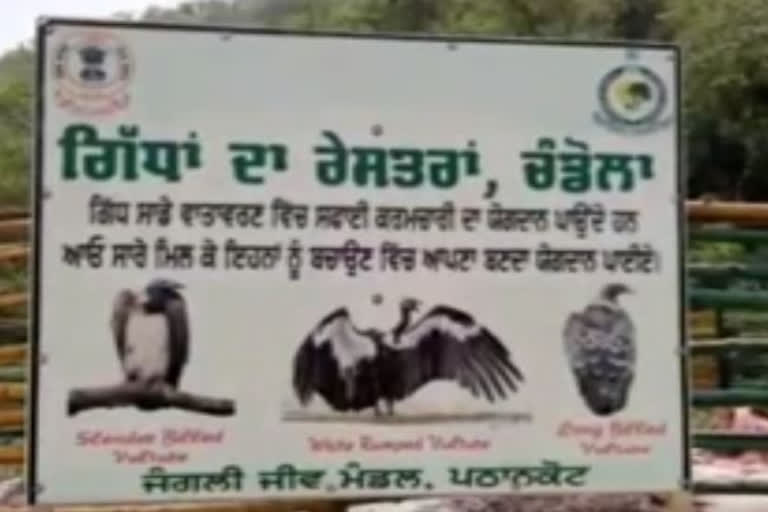Pathankot(Punjab): A 'vulture restaurant' has been opened in Punjab's Pathankot to save the endangered species of birds. The 'restaurant' is actually a marked open space where officials of the Pathankot Wildlife Department feed vultures, the scavengers that are considered nature's cleaners as they feed on carrion.
The 'restaurant' was closed in 2012 at Chandola in Dhar block by the Wildlife Department and was reopened a year ago. A large number of vultures relish the meat kept for them in the 'restaurant'. According to sources, the Wildlife Department also received a grant of Rs 7.35 lakhs from the district administration to run the 'restaurant'.
A lab has also been set up at Dhar to test the meat and after testing the meat it is served to the vultures. Apart from Pathankot, vultures from far-flung areas of Himachal also fly in to relish the food. A total of nine species of vultures are found in India. Out of these six species are resident (white–rumped vulture, Indian vulture, slender-billed vulture, red-headed vulture, bearded vulture and Egyptian vulture) and three species are migratory (cinereous vulture, griffon vulture and Himalayan vulture).
Also read: Several birds taken to hospital in Haryana's Gurugram due to heatstroke
Once numbering 40 million, mostly white-rumped, Indian and slender-billed, the numbers saw a catastrophic fall between 1990 and 2007. As per experts, 99.9 percent of white-rumped vultures, and 99 per cent of the Indian and slender-billed varieties died out between 1993 and 2007, while other species saw fall in numbers between 81 percent and 90 percent.
Experts zeroed in on diclofenac, a veterinary drug used for pain management in livestock, as the main cause of the near wipe-out of vultures, who were eating such carrion and then suffering kidney failure almost within 24 hours.
In view of this threat to vultures that brought them close to extinction, diclofenac was banned for veterinary use in India and Nepal in 2006 and in Bangladesh in 2010. Despite this ban, human-use diclofenac was being used in veterinary treatments.
Wildlife (Deputy Conservator of Forest) DFO Paramjit Singh said, "the number of vultures has been decreasing in India due to the felling of trees and lack of proper food, and their species has declined drastically. Vultures have special importance in our life for keeping the environment clean as it scavenges on carrion."
He further said that when they started the initiative, 30 to 40 vultures used to come, and now the number has reached 300-400.



